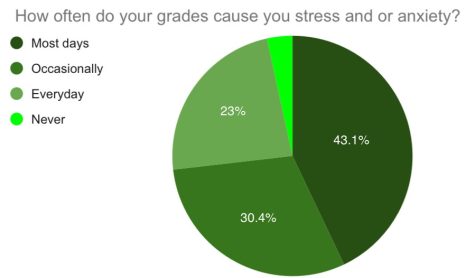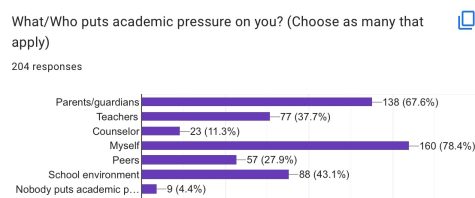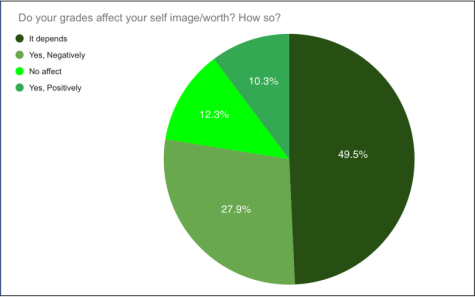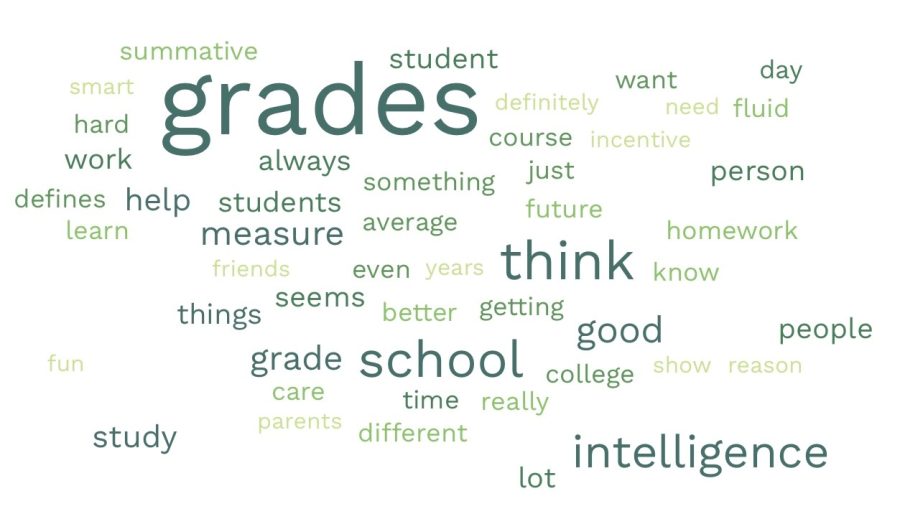How Are Grades Affecting Students?
Grades are a part of every student’s life here at West and so much importance is attached to these letters and percentage points, that students feel the pressure from all sides to excel. This year, Glenbard West adopted an A-F grading system which rewards students for demonstrating key skills, but there are gaps in how they measure student’s learning and progress.
Students report high levels of stress and academic pressure from many sources. In a student conducted survey of over 200 respondents, 66% of surveyed students reported that grades caused them anxiety on most days or everyday. Ms. Culloton, who has been working as a counselor at Glenbard West for 21 years, says that “Young people feel a lot of pressure […] I think stress is increasing for sure.” This stress can lead to more concerning results as found in a 2015 National Youth Risk Behavior Survey which found that students with mostly Ds or Fs reported more feelings of hopelessness, and are more likely to plan or attempt suicide than students with higher grade averages.

These results of academic pressure which comes from many different sources. When surveyed students were asked who puts academic pressure on them, many of them blamed their parents or guardians. Some students named the school environment, which is hardly surprising at Glenbard West, as it is a high achieving environment. U.S. News ranks it within the top 30 high schools in the state, number one in the district, and reports that 71% of seniors took at least one AP exam. However, a majority of students admitted that they put the pressure on themselves. One sophomore explains that they’ve “seen a lot through myself and my other friends how much pressure and the need they feel to get that A from every single test and or assignment. It’s not only the teachers but it’s also life at home and the parents who make it difficult as well.” The Chair of the Foreign Language and English Learners Department, Lisa Alajoki, stresses that “grades always are important but I think learning is important to students as well and sometimes I think we get a little stuck maybe on going for the grade but […]it is really about learning and that the grade will come.”

This year, Glenbard West changed the grading scale from a 1-5 to the traditional A-F, as well as returning to a 4.0 scale. When asked if a 1 or an F felt worse to them, a majority of surveyed students said both felt the same. Senior Elizabeth Tanner explained that “it seems like West should have always been this way, since it seems like the rest of the country uses letter grades.” Senior Arisha Attar says that, “the grade change didn’t really affect me as much,” and despite getting used to the 1-5 scale over the years “it doesn’t make much of a difference.” Other students think differently; 37% replied that an F felt worse to them and sophomore Nusra Mohammed describes that the change felt more shocking at first and that “I do have a more emotional reaction” to seeing an F.
There is no single way to define intelligence and judging it is inherently subjective. The grading system rewards qualities like having a good work ethic, being prompt, following directions, and being well rounded. They are designed to reward conformity and obedience, not creativity or specialization. 56% of student respondents agreed that grades are not an accurate reflection of their intelligence. Ms. Tanner believes that “grades reflect productivity and persistence. It shows that you are hard working, and always give your best.”
Our current grading system rewards generalism, or the ability to be competent in multiple fields of study rather than specialization. Karen Arnold of Boston University did a study of 81 high school valedictorians and salutatorians. 95% earned college degrees with an average GPA of 3.6. 90% are in professional jobs with 40% in the highest tiers of those jobs. Most were strong occupational achievers, but none had entered into roles she would define as visionary. Ms. Arnold posits that most people who become groundbreakers are rewarded for creative thinking, a unique specialization, or intellectual passion. For example, Steve Jobs graduated high school with a 2.65 GPA and Martin Luther King Jr. received only one A in college.
“We have been brought up in a world that has a mentality that you need good grades to get into a good college, to be successful” as Ms. Mohammed recounted. This mentality is echoed by several other Glenbard students as over 86% of survey respondents said that grades were either important or very important to them. Ms. Attar says she needs grades to “keep up to get through my school years so I can get into a good college or university and make myself and my parents proud.”
Assigning students a number or letter to represent their academic progress is nothing new, in fact it was first introduced in the U.S. in 1785 by President of Yale, Ezra Stiles who assigned the first grades given in colleges. A century later, Mt. Holyoke adopted the first letter grading system (using E as failing grade). This method of quantifying student achievement was largely reserved for elite schools, and systems varied. It was not until compulsory education transformed the United States in the early 19th century and education was standardized at the national level. The ability to have quantifiable data reflecting student learning was efficient and that method has remained a part of student’s lives for over a century now.
When so many things affect a student’s GPA, grades become a major motivator that can become secondary to the goal of learning. Ms. Alajoki explains that “the hope always is that students do learn more even if they’re going for the better grade, that learning also takes place.” One senior described that “it’s better to learn from experience and try again, even at the prospect of not doing well, than to give up[…] Sometimes experiencing failure can be your greatest success.”
A majority, 78% of surveyed students reported that fear of a lower grade affected their decision to take higher level courses. However, Ms. Culloton says the opposite is true and that “I think when students come in to pick their classes they aim really high and sometimes too much” when they come into the counseling office. She thinks that “many students have heard the message that they have to be in honors and AP classes to be successful.”
West students can also take advantage of reassessment opportunities which Ms. Alajoki says can be used by students who “just didn’t do as well as they could. Maybe they didn’t sleep well, maybe they have five other tests that day, maybe there’s a lot of other things going on.” She maintains that the ultimate purpose of reassessment is “to really make sure that our students are learning.”

Grades are simply how the American education system evaluates students, but their mental health affects are telling. 87% of students surveyed said their grades affected their self worth, with over a quarter being affected negatively. Ms. Mohammad stresses that it is important to maintain a positive attitude and “at the end of the day, grades are not everything. They mean something to me and they have a good chunk of my life, but they do not measure success for me.” And her sentiments are echoed by Ms. Attar, who maintains that “I don’t want my grades to define who I am.”

Katherine Schlueter is a senior and an Editor-and-Chief of The Glen Bard. She is also an Eagle Scout, and enjoys reading, camping, listening to music,...









